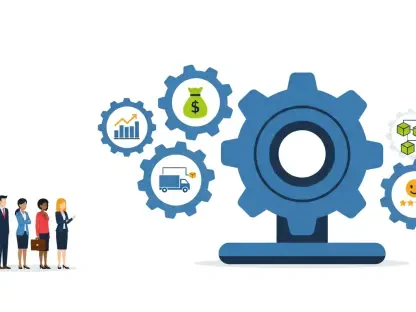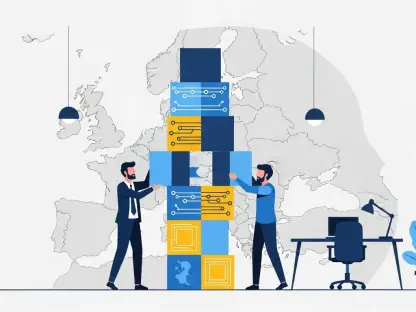Overview of the SaaS Industry in the AI Era
In an era where digital transformation dictates the pace of business, the Software as a Service (SaaS) industry stands as a cornerstone of the technology sector, delivering scalable and accessible solutions to enterprises worldwide. SaaS has evolved from a niche delivery model to a dominant force, powering everything from customer relationship management to collaborative tools. Its subscription-based structure ensures steady revenue streams, making it a reliable choice for investors and businesses alike, even amidst economic fluctuations.
The integration of artificial intelligence (AI) has emerged as a game-changer for SaaS, redefining how solutions are developed and deployed. AI enhances functionalities like predictive analytics, personalized user experiences, and automated workflows, enabling SaaS platforms to offer unprecedented value to B2B clients. This synergy is not just a trend but a fundamental shift, pushing companies to rethink their operational models and prioritize intelligent, data-driven offerings over traditional software approaches.
Focusing on the Nordics and Baltics, the region hosts a vibrant mix of established SaaS players and innovative startups, with companies like AlphaSense and Leadfeeder gaining international traction. The B2B segment, in particular, dominates the landscape, fueled by demand for efficiency-driven tools. Early-stage investments play a critical role here, nurturing nascent ideas into global contenders, while the scope of AI integration continues to expand, promising a fertile ground for technological breakthroughs.
Vendep Capital’s €80M Fund IV: Strategy and Focus
Investment Goals and Target Startups
Vendep Capital, a Finnish venture capital firm, has successfully secured €80 million for its fourth fund, aimed at bolstering early-stage B2B SaaS startups. With a target of supporting approximately 20 companies, the fund focuses on pre-seed to Series A stages, offering initial investments ranging from €0.1 million to €3 million. Beyond initial backing, Vendep commits to follow-on funding to assist portfolio companies in scaling their operations and capturing global markets.
A distinctive feature of this fund is its emphasis on AI-first products, reflecting a belief in the transformative power of AI within the SaaS domain. The vision is clear: to drive innovation by supporting startups that leverage AI to solve complex business challenges. This strategic focus aligns with broader industry movements toward intelligent automation and data-centric solutions, positioning Vendep at the forefront of technological advancement in software services.
Regional Emphasis on Nordics and Baltics
The Nordics and Baltics remain a priority for Vendep, recognized as a dynamic hub for software innovation with a strong entrepreneurial ecosystem. This region boasts a high concentration of technical talent, a culture of innovation, and supportive infrastructure, making it an ideal breeding ground for SaaS ventures. The area’s startups often exhibit a knack for creating globally competitive solutions, a trend Vendep aims to amplify through targeted investments.
Founding Partner Sakari Pihlava has articulated a commitment to being a pivotal partner for regional founders, emphasizing the unique potential within this geographic focus. By fostering close relationships with entrepreneurs, Vendep seeks to provide not just capital but also strategic guidance. This approach underscores a belief that the Nordics and Baltics can produce the next wave of category-defining SaaS companies on the world stage.
Challenges in the AI-Driven SaaS Landscape
Navigating the AI-driven SaaS landscape presents significant hurdles for startups, with high development costs topping the list of concerns. Building AI-powered solutions demands substantial investment in research, infrastructure, and specialized talent, often straining the budgets of early-stage companies. These financial pressures can impede progress, especially when competing against well-funded incumbents with established market presence.
Beyond costs, intense competition adds another layer of difficulty, as the SaaS space becomes increasingly crowded with players vying for B2B clients. Startups must differentiate through innovative, scalable offerings, often under tight timelines to capture market share. The pressure to deliver cutting-edge solutions can lead to rushed development cycles, risking quality and long-term viability if not managed carefully.
To overcome these obstacles, strategic partnerships with tech providers or larger enterprises can offer access to resources and expertise. Prioritizing talent acquisition ensures teams are equipped to tackle technical complexities, while an iterative approach to product development allows for continuous improvement based on user feedback. Such strategies can help startups build resilience and carve out a niche amidst fierce competition.
Regulatory and Compliance Considerations in SaaS and AI
The regulatory environment poses a critical challenge for SaaS and AI startups, particularly in Europe where stringent data privacy laws like GDPR set high standards. Compliance with such regulations is non-negotiable, as mishandling sensitive data can result in severe penalties and reputational damage. For B2B solutions, adhering to these rules becomes even more vital, given the scale and sensitivity of enterprise data.
Security remains a cornerstone of trust in the SaaS model, with clients demanding robust safeguards against breaches and vulnerabilities. Startups must invest in compliant architectures from the outset, embedding privacy-by-design principles into their products. This focus not only mitigates risks but also serves as a competitive advantage, reassuring clients of a commitment to data integrity.
Regulatory shifts can significantly impact product development and market entry strategies, especially in a region as tightly governed as the Nordics and Baltics. Anticipating changes in legislation, such as updates to AI ethics guidelines, requires startups to remain agile and proactive. Adapting to these evolving frameworks will be essential for maintaining market relevance and ensuring seamless expansion across borders.
Future Outlook: SaaS and AI as Growth Catalysts
Looking ahead, the SaaS industry is poised for robust growth, with AI acting as a primary catalyst for innovation and operational efficiency. The ability of AI to streamline processes, from customer support to supply chain management, is driving unprecedented demand for intelligent B2B solutions. This trend signals a shift toward automation and analytics as core components of enterprise software offerings.
Emerging patterns, such as the rise of vertical-specific SaaS platforms, indicate a move toward tailored solutions that address niche industry needs. Global economic conditions, including potential inflationary pressures, may influence adoption rates, while technological advancements like edge computing could further enhance AI capabilities within SaaS. Consumer preferences for seamless, integrated experiences will also shape how these tools evolve over the coming years.
Vendep Capital stands ready to play a pivotal role in this landscape, channeling its €80 million fund into startups that can define new categories. By aligning with market dynamics and fostering innovation, the firm aims to support ventures that not only adapt to but also drive future trends. This strategic positioning highlights a broader opportunity for investors to tap into the sustained growth potential at the intersection of SaaS and AI.
Conclusion
Reflecting on the insights gathered, Vendep Capital’s €80 million raise for its fourth fund marks a significant milestone in supporting AI-driven SaaS startups across the Nordics and Baltics. The initiative underscores the enduring strength of the SaaS model, amplified by AI’s transformative capabilities, and spotlights the region’s potential as a powerhouse for software innovation. Each element of the strategy, from investment focus to regional emphasis, demonstrates a thoughtful approach to nurturing early-stage ventures.
Moving forward, stakeholders should consider deeper collaboration between investors and founders to address challenges like high development costs and regulatory complexities. Exploring untapped markets within the B2B space could unlock new growth avenues, while continuous learning around AI advancements will be crucial for maintaining a competitive edge. These steps, combined with a commitment to agility, promise to pave the way for sustained success in an ever-evolving industry.









